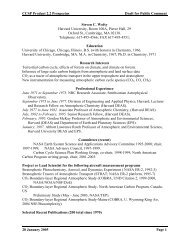Decision support experiments and evaluations using seasonal to ...
Decision support experiments and evaluations using seasonal to ...
Decision support experiments and evaluations using seasonal to ...
Create successful ePaper yourself
Turn your PDF publications into a flip-book with our unique Google optimized e-Paper software.
obust communication in which each side informs<br />
the other with regard <strong>to</strong> decisions, needs,<br />
<strong>and</strong> products—this communication cannot be<br />
intermittent; it must be robust <strong>and</strong> ongoing.<br />
Second, some RISAs employ an “information<br />
broker” approach. They produce little<br />
new scientific information themselves, due <strong>to</strong><br />
resource limitations or lack of critical mass in<br />
a particular scientific discipline. Rather, the<br />
RISAs’ primary role is providing a conduit for<br />
information <strong>and</strong> facilitating the development of<br />
information networks.<br />
Third, RISAs generally utilize a “participant/<br />
advocacy” or “problem-based” approach, which<br />
involves foc<strong>using</strong> on a particular problem or<br />
issue <strong>and</strong> engaging directly in solving that problem.<br />
They see themselves as part of a learning<br />
system <strong>and</strong> promote the opportunity for joint<br />
learning with a well-defined set of stakeholders<br />
who share the RISA’s perspective on the<br />
problem <strong>and</strong> desired outcomes.<br />
Fourth, some RISAs utilize a “basic research”<br />
approach in which the researchers recognize<br />
particular gaps in the fundamental knowledge<br />
needed in the production of context sensitive,<br />
policy-relevant information. Any RISA may<br />
utilize many or most of these approaches at different<br />
times depending upon the particular context<br />
of the problem. The more well-established<br />
RISAs have more formal processes <strong>and</strong> procedures<br />
in place <strong>to</strong> identify stakeholder needs<br />
<strong>and</strong> design appropriate responses, as well as <strong>to</strong><br />
evaluate the effectiveness of decision-<strong>support</strong><br />
<strong>to</strong>ols that are developed.<br />
Finally, a critical lesson for climate science policy<br />
from RISAs is that, despite knowing what<br />
is needed <strong>to</strong> produce, package, <strong>and</strong> disseminate<br />
useful climate information—<strong>and</strong> the wellrecognized<br />
success of the regional partnerships<br />
with stakeholders, RISAs continue <strong>to</strong> struggle<br />
for funding while RISA-generated lessons are<br />
widely acclaimed. To a large extent, they have<br />
not influenced federal climate science policy<br />
community outside of the RISAs themselves,<br />
though progress has been made in recent years.<br />
Improving feedback between RISA programs<br />
<strong>and</strong> the larger research enterprise need <strong>to</strong> be<br />
enhanced so lessons learned can inform broader<br />
climate science policy decisions—not just those<br />
<strong>Decision</strong>-Support Experiments <strong>and</strong> Evaluations <strong>using</strong> Seasonal <strong>to</strong><br />
Interannual Forecasts <strong>and</strong> Observational Data: A Focus on Water Resources<br />
decisions made on the local problem-solving<br />
level (McNie et al., 2007).<br />
In April 2002, the House Science Committee<br />
held a hearing <strong>to</strong> explore the connections of climate<br />
science <strong>and</strong> the needs of decision makers.<br />
One question it posed was the following: “Are<br />
our climate research efforts focused on the right<br />
questions”? (). The Science Committee found that the<br />
RISA program is a promising means <strong>to</strong> connect<br />
decision-making needs with the research<br />
prioritization process, because “(it) attempts <strong>to</strong><br />
build a regional-scale picture of the interaction<br />
between climate change <strong>and</strong> the local environment<br />
from the ground up. By funding research<br />
on climate <strong>and</strong> environmental science focused<br />
on a particular region, [the RISA] program currently<br />
<strong>support</strong>s interdisciplinary research on<br />
climate-sensitive issues in five selected regions<br />
around the country. Each region has its own<br />
distinct set of vulnerabilities <strong>to</strong> climate change,<br />
e.g., water supply, fisheries, agriculture, etc.,<br />
<strong>and</strong> RISA’s research is focused on questions<br />
specific <strong>to</strong> each region”.<br />
4.3.3 Developing Knowledge-<br />
Action Systems—a Climate<br />
for Inclusive Management<br />
Research suggests that decision makers do not<br />
always find <strong>seasonal</strong>-<strong>to</strong>-interannual forecast<br />
products, <strong>and</strong> related climate information, <strong>to</strong> be<br />
useful for the management of water resources—<br />
this is a theme central <strong>to</strong> this entire Product (e.g.,<br />
Weiner, 2004). As our case study <strong>experiments</strong><br />
suggest, in order <strong>to</strong> ensure that information is<br />
useful, decision makers must be able <strong>to</strong> affect<br />
the substance of climate information production<br />
<strong>and</strong> the method of delivery so that information<br />
producers know what are the key questions <strong>to</strong><br />
respond <strong>to</strong> in the broad <strong>and</strong> varied array of decisional<br />
needs different constituencies require<br />
(Sarewitz <strong>and</strong> Pielke, 2007; Callahan et al.,<br />
1999; NRC, 1999). This is likely the most effective<br />
process by which true decision-<strong>support</strong><br />
activities can be made useful.<br />
Efforts <strong>to</strong> identify fac<strong>to</strong>rs that improve the usability<br />
of SI climate information have found that<br />
effective “knowledge-action” systems focus<br />
on promoting broad, user-driven risk management<br />
objectives (Cash <strong>and</strong> Buizer, 2005). These<br />
<strong>Decision</strong> makers<br />
do not always<br />
find <strong>seasonal</strong>-<strong>to</strong>-<br />
interannual forecast<br />
products, <strong>and</strong> related<br />
climate information,<br />
<strong>to</strong> be useful for<br />
the management of<br />
water resources.<br />
119




